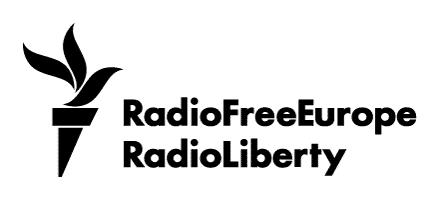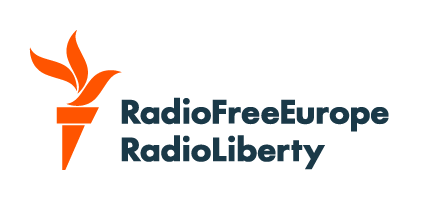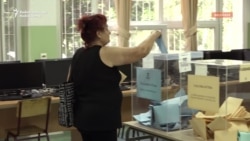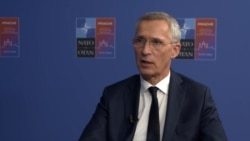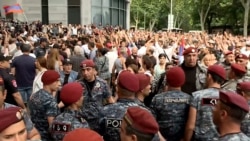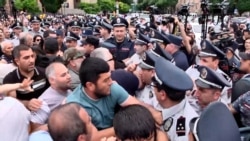News
- By RFE/RL
U.S. Report Says Russia Among 'Worst Violators' Of Religious Freedom

An independent, bipartisan advisory body has reiterated its call for the U.S. State Department to add Russia to its register of the world's "worst violators" of religious freedom, a blacklist that already includes Iran, Pakistan, Tajikistan, Turkmenistan, and six other countries.
The U.S. Commission on International Religious Freedom (USCIRF), created by Congress to make recommendations about global religious freedom, proposes in its annual report released on April 21 that Russia, India, Syria, and Vietnam be put on the "countries of particular concern" list, a category reserved for those that carry out "systematic, ongoing, and egregious" violations of religious freedoms.
The blacklisting paves the way for sanctions if the countries included do not improve their records.
Countries recommended for the State Department's special watch list, meaning there are still "severe" violations of religious freedom there, include Afghanistan, Azerbaijan, Kazakhstan, and Uzbekistan.
The USCIRF report says that "religious freedom conditions in Russia deteriorated" last year, with the government targeting religious minorities deemed to be "nontraditional" with fines, detentions, and criminal charges.
A total of 188 criminal cases alone were brought against the banned Jehovah’s Witnesses, while there were 477 searches of members' homes, with raids and interrogations including "instances of torture that continue to go uninvestigated and unpunished."
For decades, the Jehovah's Witnesses have been viewed with suspicion in Russia, where the dominant Orthodox Church is championed by President Vladimir Putin.
In 2017, Russia outlawed the religious group and labeled it "extremist," a designation the State Department has called "wrongful."
'Made-Up Charges'
Russia's anti-extremism law was also used to “persecute religious minorities, particularly Muslims," the report added.
In Russia's region of the North Caucasus, "security forces acted with impunity, arresting or kidnapping persons suspected of even tangential links to Islamist militancy as well as for secular political opposition," it said.
In occupied Crimea, the enforcement of Russia's "repressive" laws and policies on religion resulted in the prosecution of peaceful religious activity and bans on groups that were legal in the peninsula under Ukrainian law. At least 16 Crimean Muslims were sentenced to prison terms on "made-up charges of extremism and terrorism," the report said.
In Iran, the government escalated its "severe repression"” of religious minorities and continued to "export religious extremism and intolerance abroad," according to the report, which cites "scores" of Christians being "arrested, assaulted, and unjustly sentenced to years in prison."
The government also continued to arrest Baha’is and impose lengthy prison sentences on them, with between 50 and 100 followers of the Baha’i sect reported to be in prisons in Iran during the past year.
The USCIRF says religious freedom conditions also worsened in Pakistan, with the government "systematically" enforcing blasphemy laws and failing to protect religious minorities from "abuses by nonstate actors."
It cites a "sharp rise in targeted killings, blasphemy cases, forced conversions, and hate speech targeting religious minorities" including Ahmadis, Shi’a, Hindus, Christians, and Sikhs.
Abduction, forced conversion to Islam, rape, and forced marriage "remained an imminent threat for religious minority women and children," particularly among the Hindu and Christian faiths.
In Turkmenistan, religious freedom conditions "remained among the worst in the world and showed no signs of improvement," according to the report.
The government continued to "treat all independent religious activity with suspicion, maintaining a large surveillance apparatus that monitors believers at home and abroad."
"Restrictive state policies have 'virtually extinguished' the free practice of religion in the country, where the government appoints Muslim clerics, surveils and dictates religious practice, and punishes nonconformity through imprisonment, torture, and administrative harassment," the report said.
More News
- By AP
Scholz: We Will Defend 'Every Square Inch' Of NATO Territory
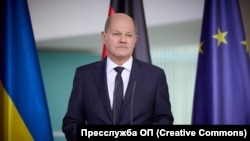
German Chancellor Olaf Scholz said on June 2 that it should be clear to Moscow that NATO will be ready to defend itself if necessary. Speaking at the Eastern German Economic Forum also attended by Lithuanian Prime Minister Ingrida Simonyte, Scholz said Germany has played a leading role in NATO's presence in the Baltics on Russia's border. "And because the threat from Russia will continue, we and other allies decided last year to deploy additional units to the Baltic states and to station an entire brigade there permanently in future," Scholz said, according to a speech manuscript. "But this turnaround in security policy is necessary to show Russia: We are prepared to defend every square inch of NATO territory against attacks."
Refinery Fire In Russia's Komi Region Kills 2; Drones Not Suspected
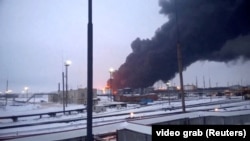
Two workers were killed in a fire at a LUKoil-owned refinery in the city of Ukhta, in the Komi region, during what Russia's Emergencies Ministry said on June 2 was scheduled technical work. An unknown number of people were also injured in the fire, which started in a storage tank, media reports said. Russian oil refineries have become a frequent target of Ukrainian drone attacks, but Vladimir Uyba, head of the region, said the fire was not related to drones. Local authorities said a commission had been established to investigate the cause of the blaze. To read the original story by RFE/RL's Russian Service, click here.
- By Reuters
Iran Summons Chinese Ambassador Over Gulf Islands
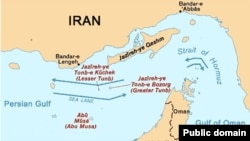
Iran's Foreign Ministry has summoned the Chinese ambassador in Tehran to protest about a China-U.A.E. statement related to Iran's sovereignty over three Islands also claimed by the U.A.E., Iranian state media reported on June 2. The islands - Abu Musa and Greater and Lesser Tunb -- are claimed by both countries but have been held by Iran since 1971, shortly before the seven Gulf emirates gained full independence from Britain and formed the U.A.E., which is now allied with Washington. "Iran's objection to the Chinese support of baseless claims in a shared U.A.E.-China statement has been expressed to the Chinese ambassador in Tehran," state media said. China has been one of Iran's biggest trading partners for the past decade.
Opponents Of Georgia's 'Foreign Agent' Law Gather For Fund-Raising Rally

Georgian opponents of the recently passed "foreign agent" law to heighten public scrutiny on outside funding of NGOs and online media are preparing to gather for a rally in downtown Tbilisi later on June 2.
They are expected to voice anger at the widely criticized legislation, which threatens to stall the Caucasus nation's EU drive and dampen relations with the United States.
The stated aim of the evening concert of "Georgian musicians for a European future" is to raise funds for individuals arrested during weeks of protests at the ruling Georgian Dream party's reintroduction of what critics call "the Russian law."
A video clip by the organizers vows "invincible unity...born in the struggle for a common goal" as the clock ticks down toward enactment following a parliamentary override last week of President Salome Zurabishvili's veto.
Some of the protesters detained during demonstrations countered by tear gas, water cannon, and allegedly rubber bullets that injured opponents and journalists could face years in prison under criminal charges.
Billionaire founder Bidzina Ivanishvili's Georgian Dream party has argued the legislation will increase transparency.
But critics including international rights groups and Western leaders see a threat of the law being used to suppress dissent and target political enemies the way a similar law has been used to jail and muzzle Russian detractors of President Vladimir Putin.
Georgia's opposition United National Movement said on June 1 that its offices in Tbilisi were attacked overnight by dozens of masked men, with glass broken and equipment damaged.
It alleged that the damage was inflicted by 30-40 "titushky," a term for the frequently masked thugs who have beaten and harassed protesters since Georgian Dream announced in March that it was reintroducing the bill.
The law requires any media outlet or NGO that gets more than 20 percent of its funding from abroad to register or face fines, although such groups must already disclose their funding to the state.
Domestic and international critics say the law leaves Georgians more vulnerable to Russian influence as Georgian Dream seemingly rebuffs democratic reforms and increasingly finds common cause with Moscow.
Georgia was granted EU candidate status in December but EU officials have repeatedly warned the "foreign influence" law threatens its path toward the 27-member bloc and said they are "considering all options to react."
Washington has announced targeted sanctions and a reassessment of bilateral relations over a law that Secretary of State Antony Blinken suggested is aimed at "undermining democracy in Georgia."
Prime Minister and Georgian Dream Chairman Irakli Kobakhidze, who along with Ivanishvili and other allies has blamed opposition to the bill in part on a vague "global party of war," said on May 31 he had called for a review of relations with the United States.
Zurabishvili and other opponents have called on Georgians to direct their anger toward Georgian Dream in looming October elections.
Some NGOs have vowed not to register and say they will pursue legal challenges to the law as it is implemented.
Russian Official Said Killed By 'Detonation' In Belgorod
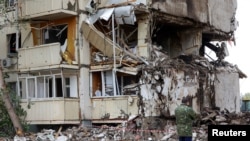
The governor of Russia's southern Belgorod region bordering Ukraine said on June 2 that a deputy district leader and Security Council secretary was killed and three other local officials suffered minor injuries when ammunition "detonated" in the Korochansky district, without elaborating. Belgorod Governor Vyacheslav Gladkov also said via Telegram that six civilians were injured by shelling while most of them were traveling by bus in the city of Shebekino, which lies about 6 kilometers from the Ukrainian border. RFE/RL could not confirm the reports. The Russian Defense Ministry said two Ukrainian drones were shot down overnight over Belgorod and the neighboring Kursk region, and another over the Sea of Azov. Belgorod and nearby regions have been subjected to nearly daily shelling and drone strikes in recent months that Russia blames on Ukraine. To read the original story by RFE/RL's Russian Service, click here.
Scattered Issues Reported As Serbia Reruns Disputed Belgrade Vote, Other Elections
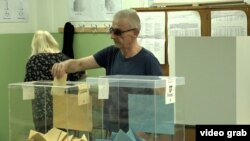
BELGRADE -- Scattered irregularities, but mostly calm conditions, were reported on June 2 as Serbia conducted elections in Belgrade and 88 other cities and municipalities after the opposition insisted that a contentious repeat vote in the capital coincide with other local voting.
Serbian authorities reported that no serious incidents had occurred during the day, although opposition leaders complained about what they said were illegal "call centers" set up by the ruling Serbian Progressive Party (SNS) to affect voting.
Members of the opposition say the call centers are being used by the SNS to bribe voters and that they contain alternative voting lists, reflecting allegations made during the earlier round of balloting.
WATCH: Belgrade voters speaking to RFE/RL expressed lukewarm enthusiasm and low expectations for the repeat vote.
Ana Brnabic, a former SNS prime minister and current parliament speaker, denied that any improper activities were being carried out at the call centers.
"We have a call center. We have members who, on Election Day, invite other members and sympathizers, family members, neighbors, and friends to ask them to go to the polls and vote," she wrote on social media.
"What's the problem? Apparently in that instead of sitting in their call centers and working, they're sitting in ours wondering why parties have call centers," she added.
Police in the northwestern Serbian city of Novi Sad claimed that some officers had been attacked, although law enforcement officials added that "there have been no serious incidents."
Following voting in December, no party was able to form a majority in the Belgrade City Assembly in an election that was highly criticized by international observers who cited "irregularities" in the local and national votes.
Those concerns echoed opposition accusations that President Aleksandar Vucic's ruling SNS party and its allies had improperly bused in voters and otherwise compromised the election, particularly in Belgrade.
Despite the alleged infractions and a strong showing in the nationwide vote by Vucic's party, SNS opponents including the Serbia Against Violence coalition formed after twin mass shootings last year garnered enough support in the capital to fuel large street protests and mobilize anti-Vucic sentiment.
An amendment to Serbia's local-election laws allowed for the voting in Belgrade to coincide with previously scheduled elections in Novi Sad, Nis, and other cities and municipalities.
But some opposition groups said they would still boycott the voting because problems including with the voter registry, undue influence by local power brokers, intimidation, and other problematic aspects had not been fixed.
A working group comprising ruling and opposition representatives was formed in late April to address some of the two dozen recommendations from the OSCE's Office for Democratic Institutions and Human Rights (ODIHR) to improve the vote process. ODIHR observers are in Serbia for the June 2 voting.
In Belgrade, voters will elect representatives to four-year terms in the 110-member City Assembly who in turn vote on a mayor.
"I'm not particularly involved in politics, but I'm aware that we should go to the elections and vote for the one whose ideology suits us most," Nina, a voter in the capital, told RFE/RL's Balkan Service on election day.
She said she didn't expect "anything special" from the vote.
Another Belgrade voter, said politicians are "full of promises" that they forget just as soon as they're elected. "You know, in my lifetime, that's happened four times, so people should come to their senses."
The unified, pro-European opposition campaigned fiercely in Belgrade ahead of the voting in December on the message that taking the capital could be the first step toward ousting Vucic and his allies, who have governed since 2012.
Vucic has embraced Russian and Chinese trade and diplomatic ties and resisted EU calls for Belgrade to join sanctions on Russia over its full-scale invasion of Ukraine since February 2022.
Iran Summons Swedish Diplomat Over Accusation It's Organizing Attacks On Israeli Embassies
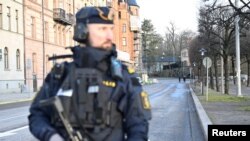
Iran has summoned the Swedish acting charge d'affaires in Tehran over what it alleges were "baseless and malicious" remarks, Tehran said on June 2, after Sweden's Sapo intelligence service accused Iran of "using criminal networks" in Sweden to attack Israeli embassies in Europe since October 7 and otherwise threaten the Scandinavian country's security. Iranian Press TV quoted the Foreign Ministry as telling the Swedish diplomat that the claims by Swedish counterintelligence head Daniel Stenling of Iranian recruitment "to target the Israeli [government's] interests" were "based on incorrect information." Israel's Mossad intelligence agency publicly accused Iran of carrying out attacks on Israeli embassies since the attack by Hamas on Israeli civilians and troops ignited the ongoing war in the Gaza Strip. Hamas has been declared a terrorist group by the United States and European Union.
Ukraine's Zelenskiy Says 100 Countries Join Swiss Peace Effort, Despite China Interference
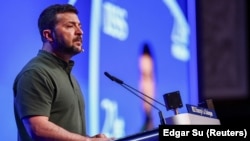
Ukrainian President Volodymyr Zelenskiy met with foreign leaders in Singapore on the final day of the annual Shangri-La Dialogue security summit on June 2, where he sought to rally international support ahead of a Swiss peace conference later this month despite what he said were Chinese efforts to undermine it.
Live Briefing: Russia's Invasion Of Ukraine
RFE/RL's Live Briefing gives you all of the latest developments on Russia's full-scale invasion, Kyiv's counteroffensive, Western military aid, global reaction, and the plight of civilians. For all of RFE/RL's coverage of the war in Ukraine, click here.
Zelenskiy said more than 100 countries and international organizations had committed to attending the mid-June peace gathering in Switzerland.
Russia hasn't been at the event in Singapore since it launched its two-year-old full-scale invasion of Ukraine.
Zelenskiy and Ukraine's defense minister, Rustem Umerov, met in Singapore for more than an hour with U.S. Defense Secretary Lloyd Austin following this week's U.S. easing of restrictions on the use of its weapons by Kyiv to publicly permit Ukraine to hit targets inside Russia.
A Pentagon official said Austin "reaffirmed the U.S. commitment" to "strong support" for Ukraine and both sides vowed to "further strengthen [their] strategic defense partnership."
Earlier, Zelenskiy met with a bipartisan delegation from the U.S. House of Representatives on the sidelines of the conference and said both sides "noted the importance of allowing Ukraine to use American weapons to strike military targets on the territory of Russia in the areas bordering the Kharkiv region."
Zelenskiy said that "The issue of further strengthening of sanctions pressure on the Russian Federation was also raised."
The Ukrainian president also met with Indonesian President-elect Prabowo Subianto, who at the same summit last year proposed an Indonesian plan for ending the war in Ukraine.
After meeting with Jose Ramos-Horta, the president of Timor-Leste, Zelenskiy said Ramos-Horta would also attend the peace summit planned for June 15-16 in Switzerland.
"It is very important for us to begin the process of establishing a just peace," Zelenskiy said. "Russia does not want to end the war. Therefore, we must work together with the entire world to bring peace closer."
Zelenskiy said recently amid reports that the European Union was trying to organize peace talks with Russian participation in Saudi Arabia for later this year that he had "no faith" in Russian President Vladimir Putin and around 200 rounds of talks dating back to Russia's occupation of Crimea in 2014 had gone nowhere.
China, which has said it wants peace in Ukraine but has tightened relations with Moscow since the invasion began, has said it will not participate in the Swiss talks.
Zelenskiy told journalists that he regretted he couldn't meet the Chinese delegation in Singapore and that Beijing wouldn't be represented in Switzerland.
He added that "China, unfortunately...is working hard today for countries not to come to the peace summit." He also said Chinese support for Russia would prolong the war.
U.S. Pentagon chief Austin met with his Chinese counterpart, Defense Minister Dong Jun, in Singapore in their first face-to-face meeting since those contacts broke down in 2022 with tensions ratcheted up over bilateral issues, Taiwan, and Beijing's refusal to condemn and punish Russian aggression in Ukraine.
Also on June 2, Ukraine's military said its air defenses had intercepted 24 of 25 Russian attack drones overnight as the country sought to rebound from one of the biggest overnight attacks in weeks on Ukraine's power infrastructure a day earlier.
That attack killed at least eight people in the northeastern region of Kharkiv, police said, where a Russian offensive began last month.
As a result of those and other damaging attacks, state energy provider Ukrenerho said it was reintroducing blackouts for households and industrial users "in all regions of Ukraine" in the early morning and evening hours on June 2.
U.S. Secretary of State Antony Blinken said on May 31 that President Joe Biden had given Ukraine the go-ahead to use U.S. weapons to strike inside Russia for the limited purpose of defending Kharkiv as it tries to defeat Russian troops that began a full-scale invasion in February 2022.
With reporting by Reuters and AFP
Iran's Ex-President Ahmadinejad Joins Hard-Line Field To Replace Raisi
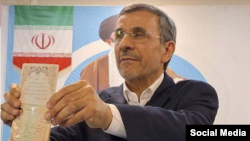
Iranian ex-President Mahmud Ahmadinejad has joined a growing list of overwhelmingly hard-line candidates in a presidential election later this month to replace the late Ebrahim Raisi, who died along with Iran's foreign minister in a helicopter crash near the Azerbaijani border in mid-May.
Ahmadinejad announced his intention to run on June 1, and state media reported on June 2 that the 67-year-old and longtime enemy of reformists had registered.
His announcement follows similar pledges by a former commander in the Islamic Revolutionary Guards Corps (IRGC) who is under U.S. sanctions, Vahid Haghanian, Tehran Mayor Alireza Zakani, and the longtime former speaker of Iran's parliament, Ali Larijani.
Ahmadinejad, Larijani, and other potentially competitive contenders were barred from running against Raisi in the 2021 presidential election by vetting institutions that routinely ban moderates and other challengers from Iran's tightly controlled elections.
Candidate registration for the June 28 election closes on June 3. The Guardians Council will announce the final list of candidates on June 11 after it has completed its vetting procedures.
Before his death, the former prosecutor Raisi was widely seen as a potential successor to 85-year-old Supreme Leader Ayatollah Ali Khamenei, who holds ultimate political and religious power under Iran's clerically dominated system.
Ahmadinejad served two terms between 2005 and 2013, and his second term was dogged by fierce protests over his disputed reelection in 2009 and a brutal crackdown. He appeared increasingly willing to challenge Khamenei publicly as his presidential tenure mounted.
Haghanian was designated for sanctions by the United States in 2019 for his role in Khamenei's "inner circle responsible for advancing the regime's domestic and foreign oppression."
The U.S. Treasury Department said in a news release announcing the sanctions that Haghanian had been "referred to as the supreme leader's right hand.”
Zakani was approved to run in the last presidential election but withdrew after some of his rivals nicknamed him the "cover candidate" of Raisi.
Former lawmaker Zohreh Elahian, who has been designated by the European Union for sanctions, on June 1 became the first woman to successfully apply to run.
Former chief nuclear negotiator Saeed Jalili on May 30 became the first political heavyweight to register his candidacy.
Other candidates have also applied.
Iran's presidential and other elections are plagued by low turnout that has worsened in recent years, spurred by disqualifications and crackdowns on dissent.
Rights groups have complained of an intensified clampdown on public expressions of discontent since Raisi and Foreign Minister Hossein Amir-Abdollahian and several others died in the helicopter crash in a mountainous region of northwestern Iran while returning from an official visit to Azerbaijan.
Raisi had been accused of serving as a prosecutor for an "execution committee" that sent thousands of political prisoners and regime opponents to their deaths in the late 1980s.
Statue Of Wagner Founder Prigozhin Unveiled At His Grave In St. Petersburg

A statue of Yevgeny Prigozhin, the deceased founder of the Wagner mercenary group, was unveiled on June 1 at his grave in St. Petersburg. Prigozhin, who died last summer in a suspicious plane crash in Russia's Tver region, would have turned 63 on June 1. Members of the Russian private military company laid flowers and took photographs after the statue was unveiled. The life-like statue, cast in bronze, stands in front of Prigozhin's tombstone, which is almost as tall as the statue. Prigozhin's forces launched a rebellion in June 2023 and briefly took control of Rostov-on-Don. Many believe the plane crash two months later was orchestrated by the Kremlin in retaliation. To read the original story by RFE/RL's Russian Service, click here.
- By Reuters
Moldovan Opposition Leader Calls For Better Ties With Russia, China
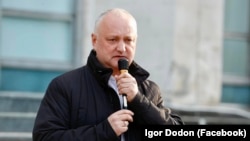
The pro-Russian leader of Moldova's largest opposition party has called for better relations with Russia and China and urged other groups to join forces in fielding a single challenger to pro-Western President Maia Sandu in the country's October election. Igor Dodon, leader of the leftist Socialist Party and a former president who was defeated by Sandu in 2020, said Moldova was ignoring its traditional allies -- Russia, China, and other countries -- and called on Chisinau to "return to a normal dialogue" with those partners. Sandu views Russia as one of the biggest threats facing Moldova and has led the effort to join the European Union. A referendum on EU membership will take place alongside the presidential election.
- By AP
Afghan Held After Knife Attack At German Event Against 'Political Islam'
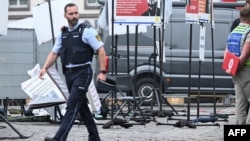
A German court on June 1 ordered a 25-year-old man born in Afghanistan held on suspicion of attempted murder in connection with a knife attack at an event organized by a group opposing "political Islam" that left six people injured. The victims included a police officer who remained hospitalized with life-threatening injuries. Officials offered no information regarding the motive for the attack on May 31 in the city of Mannheim. Officials said that the suspect, who was shot and wounded by police, was hospitalized and not in a condition to be questioned. They said he had lived in Germany since 2014 and had no police record.
Supreme Leader Ally, Tehran Mayor Register To Run In Iran's Presidential Race
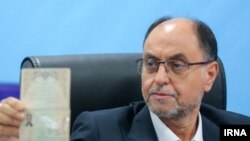
A former commander in the Islamic Revolutionary Guards Corps (IRGC) who is under U.S. sanctions and the mayor of Tehran are among the politicians who registered their intent to run in Iran's presidential election later this month.
Vahid Haghanian, the former IRGC commander and a member of Supreme Leader Ayatollah Ali Khamenei's inner circle, and Teheran Mayor Alireza Zakani will have to wait to see if their candidacies are approved by the Guardians Council, a 12-member body of jurists that vets all candidates for public office.
Candidate registration for the June 28 election closes on June 3. The Guardians Council will announce the final list of candidates on June 11 after it has completed its vetting procedures.
The council disqualified several reformist and moderate candidates from the last presidential election in 2021.
This year's election was called after President Ebrahim Raisi was killed on May 19 in a helicopter crash.
Haghanian was designated for sanctions by the United States in 2019 for his role in Khamenei's "inner circle responsible for advancing the regime's domestic and foreign oppression."
The U.S. Treasury Department said in a news release announcing the sanctions that Haghanian had been "referred to as the supreme leader's right hand.”
His presence close to Khamenei at most ceremonies has been noted, and there had been rumors about his role and influence in Khamenei's office.
Speaking at election headquarters, Haghanian said he had forged close ties with key officials in state institutions "during 45 years of service in the presidential administration and the office of the supreme leader."
He said his decision to run was "personal," and he described himself as "fully familiar with the issues of the country."
Zakani, the current mayor of Tehran, was approved by the Guardians Council in the last election. But he withdrew after some of his rivals nicknamed him the "cover candidate" of Raisi.
Zakani, asked by a reporter if he was ready for this year's election, smiled but did not answer.
Masud Pezeshkian, a member of parliament, also entered the Interior Ministry building on June 1 to apply to run in the election. He previously said that he would not be a "cover candidate" for Raisi.
Former lawmaker Zohreh Elahian, who has been designated by the European Union for sanctions, on June 1 became the first woman to successfully apply to run. Four other women previously applied to register, but the head of the country's election headquarters said none of them met the necessary conditions.
Fadahosein Maliki, a member of parliament and the head of the headquarters for combating goods and currency smuggling in the second government of Mahmud Ahmadinejad, also registered his candidacy on June 1.
Former chief nuclear negotiator Saeed Jalili on May 30 became the first political heavyweight to register his candidacy. The hard-liner is close to Khamenei and was his chief of staff in the early 2000s. He currently serves as one of Khamenei's two representatives in the Supreme National Security Council.
Another well-known politician who has registered is Ali Larijani, a former parliament speaker and nuclear negotiator. He registered his candidacy on May 31.
Once considered a political heavyweight, Larijani was surprisingly disqualified from running in 2021 by the Guardians Council, whose members are directly and indirectly appointed by Khamenei.
Wide disqualifications by the Guardians Council in previous parliamentary and presidential elections and violence against anti-government protesters are among the reasons for low voter turnout.
With reporting by Reuters
- By RFE/RL
Orban Tells Supporters Fidesz Needs Victory In European Elections

Tens of thousands of Hungarians marched in Budapest on June 1 in support of nationalist Prime Minister Viktor Orban, who faces a challenge from a political newcomer ahead of next week's European Parliament elections.
The demonstration, dubbed by organizers as a "peace march," drew Orban supporters from all over Hungary and neighboring countries.
Orban hopes his Fidesz party, which is not affiliated with any grouping in the European Parliament, will benefit in the June 9 election from a rise in far-right support across Europe.
Fidesz is leading in Hungarian polls, but victory is not assured in light of a challenge by the new Respect and Freedom party, formed by former Fidesz insider Peter Magyar, who has amassed thousands of supporters and is posing the most serious challenge in Orban's 14 years in power.
Orban said victory in the elections "is needed" and predicted that Fidesz would receive "reinforcements" from every European country and be able to form a pro-peace European coalition in Brussels.
He also commented on the U.S. presidential election, saying that Americans in November will have "a chance to elect a pro-peace president," referring to presumptive Republican presidential nominee Donald Trump.
"Together with [the Americans], we will be able to form a pan-Western trans-Atlantic peace coalition," Orban said. "At the beginning of this year, we were a minority. At the end of this year, we may represent a majority throughout the Western world."
Orban has long been at odds with fellow EU members over several issues, including his refusal to send weapons to Ukraine. He addressed the flag-waving crowd, saying that Europe "must be prevented from rushing into war, into its own destruction."
Orban, who has repeatedly said Ukraine cannot win, said the war "has no solution on the battlefield" and reiterated his call for negotiations to end the full-scale invasion Russia launched in 2022.
Orban also sent greetings to ethnic Hungarians in Ukraine's Transcarpathia region who he said were desperately waiting for the war to end.
"We wish you strength," he said. "We are with you. You are in our thoughts. And we assure you: The day is not far when your fortunes will turn for the better."
He also sent greetings to Slovak Prime Minister Robert Fico, who survived an assassination attempt on May 15.
Referring to Fico as Slovakia's pro-peace prime minister, he said he was shot because he had supported peace.
He wished Fico a speedy recovery and said once Fico returns to his duties, "Hungary with Slovakia will continue to fight for peace together."
With reporting by AP, AFP, and dpa
Georgian Opposition Party Reports Attack On Tbilisi Offices
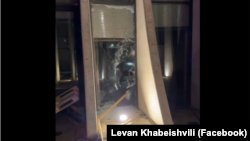
Georgia's opposition United National Movement said its offices in Tbilisi were attacked overnight by dozens of masked men, with glass broken and equipment damaged, according to images posted by the party on social media. The Georgian Interior Ministry told RFE/RL's Georgian Service that an investigation into the attack had been opened. The incident comes amid heightened tensions after the ruling Georgian Dream party pushed through parliament controversial "foreign agent" legislation that critics say mirrors legislation used in Russia to crack down on dissent. To read the original story by RFE/RL's Georgian Service, click here.
Zelenskiy Meets With U.S. Lawmakers Ahead Of Speech At Shangri-La Dialogue
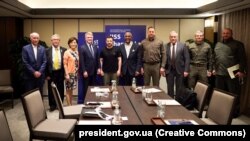
Ukrainian President Volodymyr Zelenskiy met with a delegation of U.S. lawmakers in Singapore on June 1 to discuss further military assistance to Ukraine.
Zelenskiy, who traveled to Singapore for the Shangri-La Dialogue conference, met with the bipartisan group, who are members of the U.S. House of Representatives' Foreign Affairs Committee.
"We talked about the frontline situation and military assistance, particularly additional systems and missiles to strengthen our air defense," Zelenskiy said on the social media platform X, formerly Twitter. "We paid special attention to increasing sanctions against Russia."
The press service of the president's office said that the parties discussed "key areas of further military assistance to Ukraine, in particular, in strengthening air defense with additional systems and missiles."
The delegation of U.S. lawmakers was led by the chairman of the House Foreign Affairs Committee, Representative Mike McCall (Republican-Texas). Representative Gregory Meeks (Democrat-New York), the ranking Democrat on the committee, and two other members also met with Zelenskiy.
"The parties noted the importance of allowing Ukraine to use American weapons to strike military targets on the territory of Russia in the areas bordering the Kharkiv region,” the president's office said.
U.S. Secretary of State Antony Blinken said on May 31 that President Joe Biden had given Ukraine the go-ahead to use U.S. weapons to strike inside Russia for the limited purpose of defending the eastern city of Kharkiv.
Speaking in Prague on May 31 at an informal meeting of NATO-member foreign ministers, Blinken said Ukraine had asked Washington for authorization to use U.S. weapons to strike inside Russia as it tries to defeat Russian troops that began a full-scale invasion in February 2022.
Zelenskiy is scheduled to speak on June 2 at the Shangri-La Dialogue, a conference sponsored by the International Institute for Strategic Studies. He also plans to meet with U.S. Defense Secretary Lloyd Austin for further discussions on support for his embattled country.
After arriving at the conference venue in a motorcade amid heavy security, Zelenskiy said in a statement on X that he had come to gather support from the Asia-Pacific region for a peace summit planned for June 15-16 in Switzerland.
He said he planned to hold several meetings, including with Singaporean President Tharman Shanmugaratnam and Prime Minister Lawrence Wong, Timor-Leste President Jose Ramos-Horta, and Singaporean investors.
As Many As 20 Die In Afghanistan After Overloaded Boat Sinks Crossing River
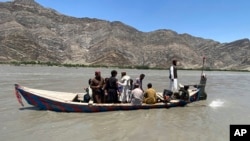
A boat carrying 25 people sank while crossing a river in eastern Afghanistan on June 1, officials of the country's Taliban-led government said.
Quraishi Badlon, director of the Information and Culture Department in Nangarhar Province, said the boat sank on a river in the Mohmand Dara district, killing 20 people, including women and children.
He later revised the number of dead downward to eight.
Moulvi Mohammad Ajmal Shagwal, the district governor of the Taliban-led government in Mohmand Dara, told RFE/RL that nine bodies had been removed from the river with help from local residents.
He said that there were 25 people on board the boat, which sank at 7:30 a.m. local time. Ten people survived, all of them with injuries, he said.
Badlon also said the boat was carrying 25 people, and initially said only five survived.
When he revised the number of deaths downward to eight, he said two people were missing. He added in a post on X that 16 people had been rescued by civilians and authorities. At least 10 were injured and several were taken to a hospital, he said.
Shagwal said there were women and children on the boat, but he did not give details. According to the province's Public Health Department, the bodies recovered thus far include those of a man, a woman, two boys, and a girl.
Sherzad Ahmad Khel, one of the survivors, said that the boat sank because too many people were on board.
The government's Bakhtar news agency published a video message in which an official said many people got into the boat, and when it reached the middle of the river, its motor overheated and burst into flames. The boat then flooded and sank, leaving its passengers to fend for themselves.
District resident Abdul Majeed told RFE/RL that people had used the same boat to cross the river almost every day to get to work and shop in the district market. He stressed that a bridge should be built.
"It is very important to build a bridge here. We asked the previous government, but it was not built. We are still demanding that the government build a bridge for us. If the bridge is not built, similar incidents will happen."
People of Mohmand Dara and other districts of Nangarhar use small boats to cross the river due to the lack of bridges.
A few years ago, a number of people died in a similar boat sinking incident in district.
With reporting by AP and AFP
Russia Targets Ukraine's Energy Infrastructure In Latest Air Strikes
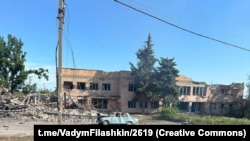
Energy infrastructure in five regions across Ukraine was damaged in the latest Russian attack, Ukrainian officials said on June 1, causing injuries and prompting President Volodymyr Zelenskiy to appeal for the delivery of more air defenses.
Energy facilities were damaged in the eastern Donetsk and southeastern Zaporizhzhya and Dnipropetrovsk regions, as well as the central Kyrovohrad and western Ivano-Frankivsk regions, Ukrainian power grid operator Ukrenerho said.
Live Briefing: Russia's Invasion Of Ukraine
RFE/RL's Live Briefing gives you all of the latest developments on Russia's full-scale invasion, Kyiv's counteroffensive, Western military aid, global reaction, and the plight of civilians. For all of RFE/RL's coverage of the war in Ukraine, click here.
"This morning the Russians launched another strike on Ukrainian energy facilities. Since March it is already the sixth massive, complex missile and drone attack against civilian energy infrastructure," Ukrenerho said.
DTEK, Ukraine's largest private energy-generating company, said that during the attack two of its thermal power plants had been hit and equipment "seriously damaged." It did not specify where those facilities were.
"Russia's main goal is to normalize terror, to use the lack of sufficient air defense and determination of Ukraine's partners," Zelenskiy said on the Telegram messaging app.
"Partners know exactly what is needed. Additional 'Patriots' and other modern air-defense systems for Ukraine. To accelerate and expand F-16 deliveries to Ukraine. To provide our soldiers with all the necessary capabilities."
Russia has increased its bombing of Ukrainian civilian energy infrastructure since March, destroying much of the country's thermal and hydropower capacity, causing blackouts and pushing electricity imports to record highs.
Kharkiv Governor Oleh Synyehubov said 12 people, including eight children, were hospitalized after a strike close to two houses where they were sheltering.
Synyehubov also said the death toll had risen to seven from a Russian air strike on an apartment building in the city of Kharkiv on May 31.
The Lviv region's governor, Maksym Kozytskiy, said four people were injured and three critical infrastructure facilities were hit in the region on Ukraine's border with Poland. He gave no further details.
Earlier, the Ukrainian Air Force reported that air defenses had shot down 35 of 53 Russian missiles and 46 of 47 drones.
"Russian terrorists do not abandon their intention to destroy the fuel and energy sector of the country. The air force and the defense forces of Ukraine are doing everything possible to prevent the enemy from achieving its goals on every part of the front," the air force commander, General Mykola Oleshchuk, said.
Regional officials reported that firefighters were extinguishing fires on several sites following the strikes. There were no immediate reports of casualties.
The fresh Russian strikes come two days after U.S. President Joe Biden gave Ukraine permission to use U.S. munitions to strike inside Russia for the limited purpose of defending Kharkiv, which Russia has targeted in recent weeks with artillery strikes from its territory.
Speaking to RFE/RL on May 31 in Prague on the sidelines of a meeting of NATO foreign ministers, NATO Secretary-General Jens Stoltenberg said the shift in policy was "legitimate." as Ukraine defends itself.
Until now, Ukrainian forces had been unable to strike Russian forces massing in Russian territory with Western-supplied weapons, because of concerns by the United States and some of Ukraine's other Western allies that doing so would escalate the war.
"The right of self-defense also includes the right to strike targets on the territory of the aggressor. And that's exactly what Ukraine must be able to do," Stoltenberg said.
Russia Declares Barred Presidential Candidate, Soldiers' Wives Group 'Foreign Agents'

The Russian Justice Ministry on May 31 added Yekaterina Duntsova, who last year filed documents to register to run for president, to its list of so-called "foreign agents."
Duntsova announced in November 2023 that she was running for president on a platform of ending Russia’s full-scale invasion of Ukraine.
Duntsova, a journalist from the city of Rzhev and a former deputy of the Rzhev city council, has publicly appealed for an end to the war in Ukraine and spoken out against political repression in Russia.
The Central Election Commission in December refused to allow Duntsova to register her party and begin collecting signatures and campaigning. Duntsova believes that she was not allowed to participate for political reasons.
Russian President Vladimir Putin easily won a fifth term in office unchallenged by any meaningful opposition in the March 17 presidential election.
Earlier this month Putin signed a law prohibiting "foreign agents" from running in elections at any level in Russia. That means Duntsova and others labeled "foreign agents" will no longer be able to officially participate in politics.
However, Duntsova said she would not give up on creating her own party that will put forth candidates who will be able to take part in elections.
"My status does not affect the party and its members in any way. Therefore, we will continue, we will prepare candidates for the Moscow City Duma and for other elections," she said on Telegram.
The Justice Ministry also on May 31 declared a women's organization that has been campaigning for the return of mobilized men as a "foreign agent."
The ministry addded the Put Domoy (The Way Home) movement, which has organized women-led protests in Moscow to bring mobilized men back from Ukraine, to its "foreign agent" list.
The Justice Ministry accused Put Domoy of working to create a "negative image" of Russia and the Russian Army and said it had called for illegal protests.
Wives of Russian men mobilized to fight in Ukraine make up the bulk of the organization's membership.
The register of "foreign agents," which Moscow has used to silence dissent, now also includes political strategist and human rights activist Marina Litvinovich and Pavel Ivanov, known as the blogger Partisan, and the publications Republic and Sota, one of the few independent media reporting from Russia.
Sota had previously been added to the register of so-called "undesirable organizations" by the Prosecutor-General's Office.
It said the news outlet had criticized the Ukraine offensive and that its employees included "foreign agents" living abroad.
With reporting by AFP
- By Reuters
Georgian PM Calls For Review Of Relations With U.S.
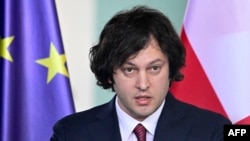
Georgian Prime Minister Irakli Kobakhidze on May 31 called for a review of relations with the United States after Washington ordered punitive measures over passage of a "foreign agent," law. "Georgian-American relations must truly be reviewed. We'll discuss this with the ambassador," Kobakhidze said, according to Russia's RIA Novosti news agency. Georgia's parliament, controlled by Kobakhidze's Georgian Dream party, passed the law requiring organizations receiving more than 20 percent of their funding from overseas to register as agents of foreign influence. The legislation has sparked large street protests. Opponents say it is authoritarian and inspired by similar legislation in Russia.
- By AP
France Files Terror Charges Against Chechen Teen Accused Of Plan To Attack Olympic Fans
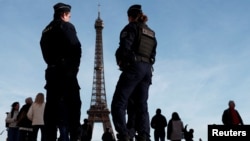
French authorities on May 31 filed preliminary terrorism charges against an 18-year-old man from Chechnya accused of a plot targeting spectators attending soccer games at the upcoming Paris Olympics. Interior Minister Gerald Darmanin said in a statement that members of the General Directorate of Internal Security arrested him on May 22 on suspicion of being behind the plot. The man is accused of planning a "violent action"’ on behalf of the Islamic State group's jihadist ideology, the national counterterrorism prosecutor's office said in a statement. The man, who was not identified, is in custody pending further investigation. The Paris Olympics start in eight weeks.
4 Pakistani Soldiers Killed By Roadside Bomb
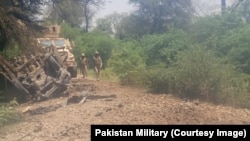
Four army soldiers were killed and three injured when their vehicle hit an improvised explosive device planted in Pakistan's northwestern Khyber Pakhtunkhwa Province. A military officer told RFE/RL on condition of anonymity that the incident occurred on May 31 in the Janikhel area of Bannu district, bordering the North Waziristan tribal district. There's been no claim of responsibility for the attack. To read the original story by RFE/RL's Radio Mashaal, click here.
Former Armenian President Sarkisian Acquitted On Corruption Charges
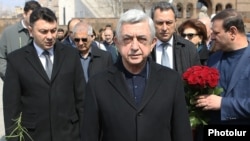
Former Armenian President Serzh Sarkisian has been acquitted more than four years after going on trial on corruption charges that he rejected as politically motivated.
Prosecutors said they will appeal the verdict handed down on May 31 by a Yerevan court.
Sarkisian, who ruled Armenia from 2008-18, was charged with giving privileged treatment in 2013 to his longtime friend, businessman Barsegh Beglarian, which allegedly cost the state more than $1 million in losses.
According to the prosecution, Sarkisian made sure that a government tender for supplies of subsidized diesel fuel to farmers was won by Beglarian's Flash company, rather than another fuel importer that offered a lower price.
The ex-president has said all along that the tender was fair because only Flash met the bidding specifications set by the Agriculture Ministry.
He also claimed that he and Beglarian were indicted as part of a political vendetta waged by Prime Minister Nikol Pashinian. The latter came to power in 2018 while leading mass protests that forced Sarkisian to resign.
Sarkisian's lawyer, Amram Makinian, praised the judge who presided over the marathon trial for clearing his client of any wrongdoing.
"This verdict shows that justice in Armenia is not yet completely dead and that we still have a chance to restore it," Makinian told reporters after its announcement.
"There was no evidence whatsoever in the case file of my defendant's wrongdoing," Makinian said, calling the verdict "the only possible ruling that the court could have delivered."
Sarkisian was more reserved. "It's not that I'm thrilled by this decision or that a different decision would have been a tragedy for me," he said. "Given the fact that the statute of limitations for such deeds has long expired, this verdict has a primarily moral significance for me."
Sarkisian refused last year to enter a plea on the statute of limitations and thus cut short his trial, insisting on his desire for a formal acquittal. He would not have gone to prison even if he had been found guilty.
The ex-president, who will turn 70 on June 30, did not quit active politics after losing power. He continues to lead the Republican Party, one of the two opposition groups represented in the current parliament.
With reporting by AFP
Stoltenberg More Confident About Ukraine's Ability To Defend Kharkiv After Policy Shift On Weapons
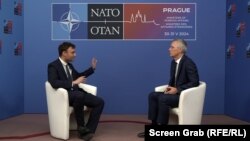
PRAGUE -- NATO Secretary-General Jens Stoltenberg says he’s more confident that Ukraine can successfully defend the eastern city of Kharkiv now that NATO allies have eased restrictions on the use of weapons they supply to hit targets inside Russia.
Stoltenberg told RFE/RL that the shift in policy, which was formally announced by the United States on May 31 and followed by Germany, was "legitimate" as Ukraine defends itself, particularly the city of Kharkiv, which lies just 35 kilometers from Ukraine’s border with Russia and has been under almost daily attack since Russia launched a new cross-border offensive about three weeks ago.
Until now, Ukrainian forces had been unable to strike Russian forces massing in Russian territory with Western-supplied weapons, because of concerns by the United States and some of Ukraine's other Western allies that doing so would escalate the war.
"The right of self-defense also includes the right to strike targets on the territory of the aggressor. And that's exactly what Ukraine must be able to do," Stoltenberg said, speaking to RFE/RL on the sidelines of a NATO foreign ministers' meeting in Prague.
Stoltenberg said it would be very difficult if artillery batteries, missile batteries, and airfields on the Russian side continued to be "safe for Russians" because the Ukraine was prevented from using the weapons supplied by NATO allies against them.
"I welcome, therefore, that the NATO allies have eased restrictions and made it clear that, of course, Ukraine has right for self-defense," he said.
The NATO chief said that the alliance was prepared to give Ukraine the support it needs to prevail and "stop the Russian invader." More weapons and ammunition are coming in from NATO allies, "and therefore, I am confident that Ukraine absolutely can prevail," Stoltenberg said.
Asked specifically about reports of a lack of air defenses on NATO's eastern flank, Stoltenberg said NATO was ready and able to protect all NATO allies and had agreed on new defense plans.
"We increased ambitions because we live in the more dangerous world. So there's a need to invest more to meet those requirements coming from the new defense plans, and that includes also investing more in air defense," he said.
He cited an agreement to acquire or to field 700 or more fifth-generation fighter jets, which he said will enhance air defense; that U.S. defense contractor Lockheed Martin has agreed to build a new factory for Patriot missiles in Germany; and Poland and other allies are buying "huge amounts of advanced air-defense systems."
Many other allies are ramping up production, he said, "so there will be more, and we are investing more, including air defense."
Alliance members have been under pressure for years to ramp up defense spending after agreeing more than a decade ago to raise it to 2 percent of GDP.
Stoltenberg reiterated in the interview that only a few years ago, the number of countries that met that threshold was less than 10. As of February, it was 18, and he expects that number to increase even further.
Georgia Concerns
Stoltenberg also commented on the situation in Georgia, where the parliament is on the verge of passing a so-called "foreign agent" bill that mirrors similar legislation in Russia that has been used to stifle independent media and NGOs.
Asked whether it would be necessary in response to scale down NATO’s engagement with Georgia, a country that has applied for NATO membership, Stoltenberg said the foreign agent bill “takes Georgia in the wrong direction” and NATO allies have expressed concern about it.
"We need to ensure that the aspirations of the Georgian people to live in a democratic society is something which is met," he said.
The partnership between NATO and Georgia "has broad support" within the alliance, he added, and while concerns have been raised, there has been no discussion of consequences related to the "foreign agent" legislation.
Demonstrators Led By Archbishop Clash With Police In Latest Anti-Government Protest In Yerevan
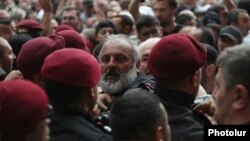
Demonstrators led by Archbishop Bagrat Galstanian scuffled with riot police in Yerevan on May 31 as they rallied in the Armenian capital to demand Prime Minister Nikol Pashinian's resignation.
One day after trying to surround the seat of Pashinian's government, the protesters marched to the nearby building of the Armenian Foreign Ministry to demand a meeting with Foreign Minister Ararat Mirzoyan.
Galstanian said Mirzoyan or other senior ministry officials must explain what he described as their failure to respond to "humiliating" anti-Armenian statements made by Azerbaijan's leaders.
The top diplomats refused to receive Galstanian and opposition lawmakers accompanying him, leading Galstanian to demand that the police let him into the building to "get the answers" himself.
"Either they will come out or we will go in," he told hundreds of supporters at the main entrance to the building, guarded by a comparable number of police.
After repeatedly threatening to use force during a four-hour standoff with the protesters, security forces tried to push the crowd back from the entrance. The protesters, including Galstanian, resisted, jostling with the police.
The Interior Ministry said afterward that at least 29 people were detained as a result. Two deacons of the Armenian Apostolic Church were reportedly among those arrested, and one of them was seriously injured, according to Galstanian.
Aram Hovannisian, chief of the national police and leader of the security forces at the scene, accused the outspoken archbishop of provoking the clash.
Galstanian, who claimed to have been kicked by one of the officers, blamed the police as well as Mirzoyan for the violence.
"Let the police know that they can't intimidate us. This is just a prelude," he said before leading the crowd back to the city's St. Anne Church, the starting point of his daily protests aimed at forcing Pashinian to step down.
The 53-year-old cleric, backed by the opposition, began his rallies in Yerevan on May 9 after leading protests in the northern Tavush Province against Pashinian's decision to cede several border areas to Azerbaijan.
Pashinian has said that the territorial concessions are necessary to prevent Azerbaijani military aggression against Armenia.
His detractors say he is creating additional security risks for the country and encouraging Baku to demand more territory.
Armenian police on May 30 scuffled with demonstrators and detained several of the activists as they rallied in the capital to demand Pashinian's resignation.
RFE/RL has been declared an "undesirable organization" by the Russian government.
If you are in Russia or the Russia-controlled parts of Ukraine and hold a Russian passport or are a stateless person residing permanently in Russia or the Russia-controlled parts of Ukraine, please note that you could face fines or imprisonment for sharing, liking, commenting on, or saving our content, or for contacting us.
To find out more, click here.
Editors' Picks
Top Trending
Russia Has Taken Steps To Protect Its Oil Refineries. Ukraine Is Still Hitting Them.
2Putin Boasts Of Russia's Hypersonic Weapons, But A Dozen Scientists In The Field Face Treason Charges
3The Controversial Chinese Firms That Will Build Georgia's Black Sea Megaproject
4Georgian PM Calls For Review Of Relations With U.S.
5Ukraine Gets U.S. OK To Hit Targets Inside Russia. Now What?
6'Preparing For A Bad Scenario': On Latvia's Russian Border As Fortification Work Begins
7Chinese-Led Consortium To Build Massive Port Project On Georgia's Black Sea Coast
8Former Putin Bodyguard, Kremlin Aide Dyumin Elevated To Key Position
9Live Briefing: Russia Invades Ukraine
10Russia Declares Barred Presidential Candidate, Soldiers' Wives Group 'Foreign Agents'
Subscribe
